#Supreme king Judai
Explore tagged Tumblr posts
Text

“Does anyone else here dare challenge the might of the Supreme King?”
Silence. His monsters, not yet dismissed back to their cards, stand intimidatingly over the crowd. Based on his commanders�� reports, there are no others here with the power to summon forth spirits from another dimension other than the singular duelist. And while with a few more years she could have almost been a challenge, she is far from such now.
One man bows. Then a woman after him. More follow, until the entire square has shown deference to their ruler.
(Snippet of Chapter 16 of When I see you again by @seventhdoctor on ao3 for the Yu-Gi-Oh! Big Bang @ygobigbang, posted on March 7th)
~ ~ ~
As a child, Judai ran away from home before his memories were ever wiped and reunited with Yubel in Professor Cobra's care. He promised to never let anything separate them again, and spent his teen years in America as Cobra's second son.
Now in his final year of school, Judai returns to Japan to visit Duel Academia as the West campus's champion. He's got plans to have a good time and help his father make a statement at the central campus with the Disclosure Duel system, but he doesn't know that his spirit partner, still corrupted by the Light of Destruction, has plans of their own - and that several other people's agendas involve him and Yubel, too.
The two partners must let go of old illusions before they can look at each other with clear eyes and meet on the same page.
https://archiveofourown.org/works/63535189/chapters/162812710
#yugioh gx#yubel gx#yubel yugioh#judaixyubel#supreme king judai#judai yuki#soulshipping#Yugioh Big Bang
19 notes
·
View notes
Text

The GX dub did irreversible things to my vocabulary and general brain chemistry
222 notes
·
View notes
Text

New supreme king deck support got me back on my haou bs ✨️
#yugioh gx#ygo gx#judai yuki#jaden yuki#yugioh#ygo#supreme king judai#haou#haou judai#supreme king jaden#admin: slifer slacker
325 notes
·
View notes
Text

???
101 notes
·
View notes
Text
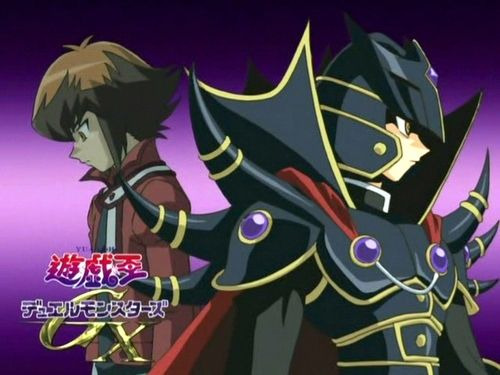

The Supreme King Judai vs. Dark Deku: How To Do a Dark Deconstruction of your Shonen Hero!
Think of this as less me complaining about My Hero Academia, and more me taking a closer look at the writing of the Dark Deku arc and why it failed to achieve what it set out to achieve.
I like to look at writing on a deeper level than Thing Bad, and Thing Good. Imagine a story is a car engine that won't start, in order to find the problem you've got to disassemble all the pieces and look at them one by one to see what pieces aren't working. That's the kind of criticism I'm talking about, break storytelling down into different tools like parts of an engine, plot, world, characterization, ideas, actions and consequences and then look if the author is using those tools effectively to sell a story.
In other words we're talking about the difference in ideas and execution. All works of fiction have ideas, even bad anime can have good ideas inside of it. The idea in question is Judai's case is can exploring the dark side of a hero. Can a hero's positive qualities also lead them down a dark path? Yu-Gi-Oh Gx answers this in a satisfying way, and My Hero Academia I'm going to argue does not.
IDEAS VS EXECUTION
One piece of writing advice I heard from Brandon Sanderson of all people that always stuck with me is "Ideas are cheap. You can always come up with more ideas."
All works of fiction have ideas and themes no matter what the Game of Thrones guy say, but some works are better at communicating their ideas than others. I want to quote a Homestuck Ending analysis of all things to explain what I'm talking about.
When you are a writer you can write anything you want. But if you want to write a story that people want to read you have to follow the rules of good storytelling. There are reasons why storytelling rules exist. A story is a bond between author and reader, readers to other readers. It is a communication between humans and humans work in a certain way. Storytelling rules are rules of communication. Rules for handling expectations and saying what you intend to say without it being misheard. Rules for tugging at emotions and pulling heartstrings in a good way rather than a bad way. Storytelling rules are lessons learned by authors of the past that failed to communicate what they needed to. They are not that subjective.
Chief among these rules is buildup and payoff. In fact one of the most basic techniques of storytelling is foreshadowing, in screenplays you usually foreshadow one important twist, then add a reminder so the audience doesn't forget, before finally paying it off.
To simplify build up and pay off I like to refer to it as question and answer. Usually a story will ask its audience a question, and usually by the end that question is answered, unless the point is to leave that question unanswered / ambiguous.
Character arcs are examples of buildup and payoff too, a lot of characters, especially in serialized media are sold on their potential future development. Here's an example, how may people got invested in Dabi years in advance because of the Dabi is a Todoroki Theory? That's an example of good buildup and payoff, because the author sewed just enough hints to build up an audience expectation and then paid it off. People became invested in the story, because they thought their investment and theories would pay off eventually and it did - so hooray!
Both MHA and YGOGX dedicate an entire arc to trying to deconstruct their main protagonist. They also seek to deconstruct the "Hero Complex" or "Saving People Complex" that each protagonist has, and ask the question if those traits are really a good thing.
This post puts it better than me so I'm going to quote tumblr user rhodanum.
‘Hero complex’ or 'saving people complex’ — an obsession with rescuing people in the face of danger, often to the exclusion of all higher thought processes. All too prevalent among shounen main leads, especially hot-blooded shounen main leads. Yuki Judai is certainly no exception. What is interesting in his case is that the writers follow the consequences of his rash, reckless, often thoughtless actions all the way to their heartbreaking logical conclusion. For those not fully in the know, it involves spiky black armor, an army of sycophants and a fall from grace that caused as much damage as a thermonuclear bomb. Don’t make perky, happy shounen protagonists snap, people. First rule.
I'm going to quote another video too, to add onto the above quote. It's from this video, starting at around 39:52
"GX is kind of famous among fans for taking its happy protagonist and stripping him down to all of his worst qualities. And that's fun. So Judai is a character who's really interesting. He's definitely open to a lot of interpretation, and you know we're gonna be leaning on my interpretation of him. Sorry. It's my video. I think he's commonly referred to a "very typical shonen protag" probably one of the most shonen protag of the yu gi oh protagonists. He is headstrong and loud, and (makes punching noises while air boxing), he is a type of character who's like I'm gonna be the best and brings everyone along on the ride. He's the kind of protagonist that everybody loves him they're all fighting over him, and Yu Gi Oh Gx really puts him up on the pedestal, of like THIS GUY. THIS GUY DOES IT ALL. Then season 3 rolls around and dares to ask: but what if that's selfish behavior?"
That's the question both MHA and YGOGX are asking in Dark Deku arc and Season 3 respectively, what if all of those behaviors that make them the typical hot blooded shonen protagonist are actually selfish? Is their hero complex really a good thing?
Each arc is tasked with exploiting the main character's flaws, until they reach their emotional breaking point and lowest point in the story. Let's see how each story treats their main character and from comparing that I want to make a point about what makes effective storytelling.
The Supreme King Haou Arc
Instead of recapping the entire arc to you, I'm going to touch upon what ideas the story setup in regards to Judai's character and how it paid off those ideas. What are the questions the story asks and what answers does it give us?
I'm going to focus on the two questions I outlined above. Is their hero complex a good thing? and What if this is selfish behavior?
Yu-Gi-Oh GX is an anime where instead of using super powers, the main characters fight each other with a magical trading card game. Besides that fact there's a lot of similarities between GX and MHA. They both take place in an academy setting where the main characters learn about using their quirks, and playing the card game better respectively. It is a shonen battle anime where almost everything is solved with a shonen fight, they just use cards instead of flashy superpowers. The main characters are all students who have to grow up and enter the adult world.
Judai and Deku are both characters that deconstruct the "hero complex" of shonen main characters. Judai is themed entirely around heroes, he has an elemental hero deck where every hero is based off a hero that appears in popular culture, he is the best duelist in the school and the one everyone calls on to save the day over and over again. As stated above he is the most Shonen Protag to ever Shonen Protag, he's a warrior therapist who makes friends and saves the day because he's really good at the card game, and will always show up to fight for his friends.
For the first two seasons Judai is built up on this pedestal of the ideal Shonen Protagonist, and praised by basically every single character for being "childish" and "pure of heart" however when Season 3 comes around the narrative stops heaping endless praise on him and starts to challenge him. However, this doesn't come from nowhere there are signs of these personality flaws of Judai, they just get swept under the rug the first two seasons.
There are several moments such as the climaxes to season 1 and season 2 where Judai fails to grasp the stakes of the situation, saying things like "Oh, this card game is really fun" when he's dueling with lives on the line. Judai in fact has a pattern of "only wanting to duel for fun", he fights because it's fun to him not because it's the right thing to do. However, he's continually forced into high stakes situation where he has to fight for others just because he's the strongest character - and constantly having to carry that on his shoulders starts to weigh on him after awhile. Judai will show up to fight and save his friends every single time they need him, and that's the source of his hero complex because after a certain point his friends start relying on him too much.
In general he also doesn't have deep thoughts of what heroes are, he admires heroes but it basically boils down do "Heroes are cool." He's kind of like Goku where he doesn't really fight for any idea of justice or to save others, just for the thrill of fighting itself. He also has a tendency to be insensitive to other people's feelings and take things for granted. For example, in Season 2 like three of his friends get possessed and Judai doesn't even do anything about it for half a season because he's too busy participating in the dueling tournament.
In general though it's a pattern of Judai only wanting to "duel for fun" and him being forced to duel to save others instead, and be responsible for other people. Judai will show up to fight for his friends, but even then he falls back on just "dueling for fun" because always having to fight for others is too much responsibility to put on his shoulders.
There's a lot of hints of Judai's flaws, but they also tend to get brushed off because shonen protagonists are just like that. Like, Judai can say some insensitive things to his friends sometimes and be oblivious to their feelings, well he's just a book dumb shonen protagonist. Judai should be taking this fight seriously, well he's just being a happy go lucky shonen protagonist, etc. etc. A lot of these things are also just swept under the rug as him just being a child, a boy-at-heart like most shonen protagonists are supposed to be.
However, season 3 starts looking at Judai not as a shonen protagonist but as a person, and it all starts with the suggestion that maybe Judai remaining a child at heart is a bad thing, especially when his friends around him are all growing up. It all starts with the introduction of this guy right here - Johan Anderson.
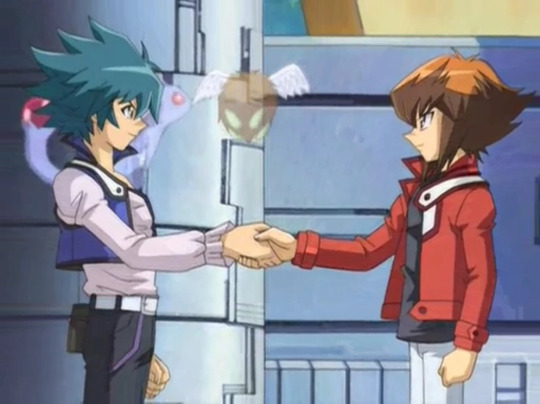
Johan shares many things in common with Judai, he can see spirits, he's a duelist who loves to duel, he has a strong connection with his cards. However, the more you compare them the more you notice that Johan has a lot of things that Judai lacks. They are so similiar that they become almost instant best friends, but even then Johan himself notices there are a few things off about Judai's behavior.
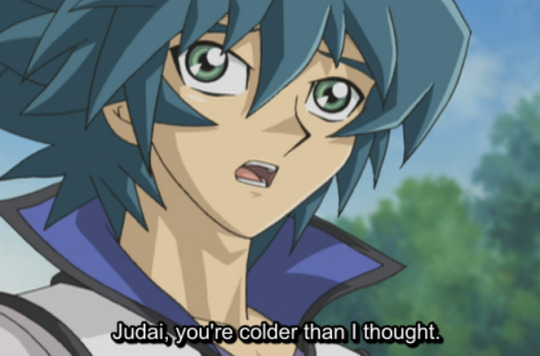
Sho: Bro... I thought you would have something to say to me. Johan: He seems lost. I think he just wanted you to give him some advice. Judai: SHo will be fine. Johan: Judai, you're colder than I thought.
It takes someone completely new to the dynamic between Judai and his friends, who likes Judai but hasn't spent the past two seasons idolizing him to realize that some of his behaviors are kind of off. That Judai isn't really the most empathic, or even that good at understanding other's feelings.
Johan is the one to point this out because he has the emotional intelligence that Judai lacks. We've been told Judai is our shonen protagonist for two seasons, only for the real shonen protag Johan to step up out of nowhere and show them how it's done. Johan is good at seeing other people's emotions, and he becomes a near instant pillar of emotional support for Judai. More than that, he also is the first person to treat Judai like an equal, he never asks Judai to save him like all of Judai's friends do, if anything they both save each other.
Johan also exists to show what Judai is lacking, mainly a reason behind why he fights.

Judai: I do it because it's fun. Or because of the surprise and delight, I guess. Well, I guess that comes down to "because it's fun", huh? Sorry, I guess that's an awkward question to ask out of nowhere. Johan: What's wrong, Juadi? Judai: Nothing, really. Johan: I have a proper goal. Judai: Don't tell anyone. Even if people don't have the power to see spirits, they can still commune with them. That's why, for those people as well... (I want to be a bridge between humans and spirits).
Judai is someone who will always show up to save his friends when he is asked, but he doesn't really have a concept of what being a hero is or the repsonsibilities it entails, he just admires heroes in a pure hearted way. Johan on the other hand has a reason to fight and that's to help humans and card spirits get along, and Judai expresses admiration for Johan because he has a goal.
At the same time this is happening, Judai gets picked apart by two villains for his lack of reason for fighting. Judai has been praised to death for two seasons for being pure of heart, but now the villains are challenging him by saying he has no "darkness of the heart". That without it the reasons that Judai fights are superficial and frivolous.
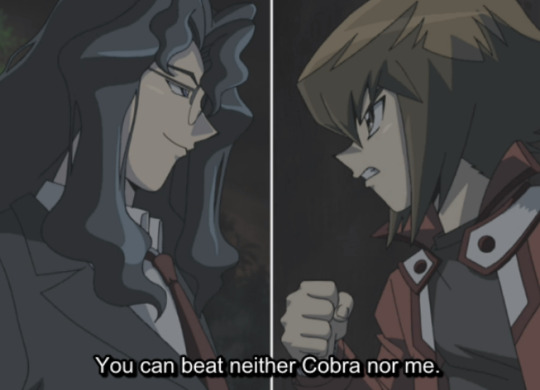
We have something that you lack. Judai: That I lack? Yes the darkness of the heart that slumbers deep within a duelist. The burden that a duelist bears in his heart. Judai, you have none of that. Judai: A burden in my heart. I have nver, not even once, dueled for myself. I doubt someone like you, who only thinks of himself could udnerstand that. Judai: What would be fun about a duel like that? It isn't fun at all! You must bear other's expectations while remaining strong. That is what it means.
Judai is a bit of a blood knight, he will be dueling with his friends lives on the lines and stop to go "Wow, this duel is really fun" and it's usually just dismissed a shim being a shonen protagonist until suddenly it isn't.
I'm gonna draw a deliberate parallel between Deku and Judai here that I'll reference later on, they both don't understand "darkness of the heart" and they need to understand it in order to grow as people.
There's also the underlying notion that being a hero is not all it's chalked up to be, to be a hero, to fight for other people's sake means also taking on their suffering. As noble as that may seem suffering is suffering.

Cobra: Fortune would never smile on a fool like you who fights while prattling on about enjoying duels. Cobra: You are certainly a talented duelist. But you have one fatal flaw. Judai: A fatal flaw? Cobra: Yes, your duels are superficial. Someone who fights with nothing on his shoulders, cannot recover once he loses his enjoyment. What a duelist carries on his shoulders will become the power that supports him when he's up against the wall! Cobra: But you have nothing like that! Those who go through life without anything like that cannot possibly seize victory. Cobra: But I know that nothing I say will resonate with you... because you have nothing to lose but the match. Judai: I... Cobra: Afraid aren't you? Right now, you have nothing to support you.
In the context of this scene, Cobra has told everyone that he's currently enacting his evil plan out of the vain hope that he can somehow revive his son from the dead.
As insane as "I think I can revive the dead" is as a motivation, fighting for the sake of your dead son is a much stronger motivation than "I think duels are fun."
Judai doesn't have an appropriate answer as to why he fights when he's questioned by the villains, and instead of coming up with his own answer he relies on the answer Johan provided for him.
Johan: You idiot. Why are you so shaken Judai? You think you have nothing on your shoulders? Give me a break! You always bear other's expectations on your shoulders. When you have other people's expectations riding on you, it means they've trusted you with their hopes! Don't you always carry those? If you lose what will happen to us here?
Johan's words snap him out of it, but this isn't Judai coming up with an answer himself it's just taking the one that's provided for him.
This is also the point where we get start to develop an answer to our question. Is Judai selfish?
In action he's not. His actions are selfless. Judai is always fighting for others, even when he only wants to duel for fun. He will show up and fight if you ask him too.
However, in motivation he is selfish. His motivations are selfish. Judai isn't fighting out of some selflessness, but because fighting for the sake of other people gives him a purpose. He keeps fighting for his friends, because he's built all of his friendships around being the one to solve their problems. It's why he Johan's answer suits Judai so well, because he thinks that's how friendship works that he has to keep carrying everyone's burden for them.
Not only does it lead to unhealthy friendships (he sees his friends as burdens) but also it's unhealthy for Judai himself (he can't keep carrying other people's burdens without getting weighed down).
Judai's hero complex, this pressure he feels to save everyone around him arises from two things, it gives him friends when he'd been a lonely child before that, and it gives him purpose. Playing the hero is how he made all of his friends, and now it's how he keeps them.
However, in spite of doing all this to keep his friends, Judai's relationship with his friends is so all give and no take that he's practically fighting alone until Johan shows up. Judai doesn't form a healthy and stable relationship with Johan however, Johan just becomes a crutch.
In Summary:
Judai's actions are selfless.
His motivations are selfish.
Judai's purpose is to carry everyone's burdens on his shoulders.
Judai's friends exist to be saved by him.
The following arc is roughly divided into four sections. Everything I've covered above happens in the first section the Cobra Arc.
Cobra Arc
Zombie Survival Arc
Dark World / Supreme King Arc
Oh Shit, Yubel's Back
The cobra arc is the introduction and it sets up the basic ideas of Judai's character that I listed above, in addition it focuses on the question of if Judai is selfish, and the idea that being a hero is a burden. There's also the third question where Judai is called to understand darkness of the heart, something Deku will also be called to do.
The Zombie Survival arc is an arc where the school is teleported to another dimension and they have to survive for several days with a limited food supply, everyone fighting, and an outbreak of zombies.
The main setup of this arc is to show how everyone is working well together as a team, even in a high stress situation. Alexis, Judai, Misawa, Kenzan, all pull together with the help of new students Johan, Austin O'Brien and Jim Crocodile Cook.
However, I'm brushing over this arc because Judai doesn't actually do much this arc. If you analyze who does what, it's mainly Johan and Austin O'Brien who are in charge of the entire school. Johan demonstrates leadership skills, calls on everyone to pull together in a time of crisis, and most importantly emotionally supports Judai all throughout.
Even when Judai is confronting the main villain of this scenario Yubel, it's Johan who shows up to support Judai, and it's Johan who wins the duel at the sacrifice of his own life. Everyone gets through the zombie arc unscathed, but it's because Johan is the hero of this part of the arc, not because of anything Judai really did.
Judai who having gone on so long carrying other people's burdens to the point where he's made saving others his purpose, has for the first time experienced someone helping him carry those burdens only to disappear and Judai does not react well to it.
This is when the story has finished setting up all the dominoes that are about to fall. We have one mini-arc drawing attention to the dark side of Judai's personality and how he doesn't understand his own darkness, and one mini-arc showing Johan being a much more effective hero and leader than Judai, demonstrating everything Judai lacks.
You Either Die a Hero, or You Live Long Enough...
Yadda yadda you know the rest. A character being undone by the same traits that made them a hero, is classic tragedy 101. It's called the Hamartia or the fatal flaw. A character's greatest strength in some situations can be their greatest weakness in others. The Supreme King Arc is a masterclass in showing how the traits Judai had that led to his success in the first season, can lead to his total ruin, and even to him becoming the villain of his own story.
Hero and Villain are much closer than you'd realize, and this becomes especially true in the relationship between Judai and Yubel. Judai shares an extremely close relationship to his antagonist foil, just like Deku does with Shigaraki.
However, in Judai's case he's the reason that Yubel turned evil. While it's not entirely his fault, Judai's decision to abandon Yubel when he was a child, made Yubel go through ten years of painful torture all alone, which is the reason behind their current madness.
To summarize Yubel and Judai's story briefly. Yubel is a card spirit, the thing that Johan wants to serve as a bridge between card spirits and humans. Judai had an incredibly close relationship with Yubel as a child, but Yubel was overprotective and used their powers to harm anyone who came near Judai. Judai launched Yubel into space hoping the righteous space rays of justice would calm Yubel down (I know that sounds stupid just go with it) but instead Yubel was hit with the light of destruction a corrupting force that made them endure years of torture. They called out for Judai's help in their dreams only for Judai to eventually forget about them with a psychologist's intervention. Eventually the satellite they were trapped in made it's way back to earth, and they almost died burning up on re-entry. When they finally crawled their way back to Judai, they found Judai had been living the past ten years happy and surrounded by friends, while they had been tortured in space and nearly died all alone.
At which point Yubel snaps, hard.
While it's not Judai's fault entirely because he was a child and he didn't know what was going to happen, he still made the decision to abandon Yubel and stuck them in that situation. Judai's actions creaeted Yubel, and now Yubel is here broken and hurt and determined to hurt all of Judai's friends.
Judai doesn't know how to cope with the guilt or responsibility for either of these things. Both for creating Yubel, and for the fact that because of Yubel Johan might now be dead.

I'm the one who made her what she is!
This is where the show starts demonstrating that understand in darkness of the heart is necessary, because Judai can't understand two things, number one the fact he might have hurt Yubel, and two how to deal with the sense of responsibility he feels towards Yubel becoming what they are, and for Johan's apparent death.
He just feels a lot of guilt, and as someone who's only been the carefree hero up until this point he doesn't know how to deal with that guilt.
Judai makes a very similiar decision to Deku. He decides to go out and hunt for Johan by himself, leaving his friends behind so he won't risk their safety. Unlike Deku however, his friends immediately follow and insist on coming along.
This is when the problems start appearing, because the second everyone enters the Dark World to look for Johan, the show starts demonstrating clearly how different Judai's leadership is from Johan.
All of Judai's flaws start popping up, he's tactless, self-centered, and doesn't consider others feelings, and most importantly of all he doesn't look before he leaps. These behaviors that could earlier be swept under the rug, just become aggravated in a high stakes situation where everyone's lives are on the line. Judai came together with everyone to look for Johan, but he keeps acting like he's alone.
Another user's meta post here summarizes Judai's actions in the Different Dimmension, more succinctly so I'm going to quote them.
Shit Judai’s friends signed up for when they went into the Different Dimension with him:
searching for Johan
working as a team
deciding as a group what risks they’re willing to take
risking their lives together, on an even playing field
Shit Judai’s friends didn’t sign up for when they went into the Different Dimension with him:
having their input thoroughly ignored
being left behind while their friend recklessly charged ahead
having essential information kept from them (Judai didn’t tell them about the fatal consequences of dueling in Dark World)
being kept from dueling without their opinion on the matter ever being taken into account
having their physical, mental and emotional well-being be completely ignored by the de-facto group-leader
being relegated to secondary importance in comparison to Johan, in Judai’s eyes
having their group leader outright break the promises he made to them
To name a few things Judai does while in the different dimmension. Almost immediately after entering the dimension he runs away from the rest of the group, forcing Austin O'Brien to follow before anyone has even gotten their bearings or investigated where they are. Make an agreement with everyone to rest and wait for Dawn to search for Johan, only to run off into the middle of the night without telling anyone. Run off ahead of the group leaving several of their members behind, and when O'Brien tells Judai that members of their group are missing and that he should go back and search for them, Judai asks O'Brien to just do it instead.
Judai doesn't see the flaws in this behavior because it's how he's been acting all along, he always runs off into danger head first and he always fights on his own. Judai's never been good at considering the feelings of others though because he's a tad socially impaired, so he just doesn't seem to notice everyone's growing concerns with how he's acting.
Once again we are asked the question, is Judai's behavior selfish?
Judai deliberately abandons his friends three times, and the third time everyone stops to discuss his behavior.
Kenzan: True, we did come to this world to save Johan, saurus... Fubuki: He did find some minor clues as to Johan's whereabouts, so I suppose it's only natural, but... Asuka: But right now, I feel something is different about Judai. Menajoume: That's right. He got us all riled up about this, and now he's totally forgotten the comrades who came along with him. Kenzan: That's really irresponsible, Saurus. Fubuki: I don't mean to be a wet blanket, but I wish he'd realize the anguish he's putting us through. Asuka: Judai isn't doing this for Johan or us now. It's for himself. He just seems to be rushing forward, headlong, to forget the responsibility he bears on his shoulders.
The answer now is yes, his motivation is selfish because it's no longer about saving Johan, but just to stop himself from feeling guilty.
The stress of the situation is aggravating Judai's worst qualities yes, but Judai's always thought about himself first before others, he's always viewed his friends more as burdens / people to be saved rather than equals.
This all leads to a situation where Judai messes up big time. The same way he abandoned Yubel, he abandons the rest of his friends to run ahead and search for Johan.
They are all kidnapped - and it's Austin who notices they are missing Judai isn't even paying attention. Austin says they should head back and look for the others, but Judai asks Austin and Jim to handle that alone so he can keep searching for Johan.
Jim: The others haven't arrived yet. Something might have happned to them on the way. Judai: I see. Sorry, but could you go back and fetch them? Jim: What? You mean you don't care what happens to them? Austin: Don't forget these are the friends that are in this with you. To fulfill our objective in this dimmension we need everyone working together. You wait here until we return. Judai: Okay, I will.
Austin and Jim agree to go back and search for the others, if Judai promises to wait for them here instead of going on ahead. A promise which Judai immediately breaks.
Which is how Judai walks right into a trap.
Judai abandons his friend so they get kidnapped. He doesn't go back to look for them, so he misses out on a chance to save them. He doesn't wait for Austin and Jim to come back, and because of that he wanders all alone into a trap.
That trap is a sacrifice ritual where the leader Brron challenges him to a duel, and every time Judai attacks one of his friends are sacrificed. Judai is forced to attack and each friend dies one by one.
Judai didn't want to attack, he didn't choose to sacrifice his friends, but he did make every decision leading up to that. The trap was easily avoidable if he 1) didn't leave his friends behind 2) went looking for his friends after they were left behind or 3) waited for Jim and Austin to come back.
Judai didn't mean to sacrifice his friends, but it's a result of his own bad decisions. It's the culmination of an arc where he's been selfishly taking his friends for granted. It's a consequence for Judai just choosing to recklessly barrel forward because he can't cope with his guilt.
Judai's lack of darkness of the heart really dooms him here, because he was blind to his own flaws until it was too late. This isn't even the part where Judai does the bad thing, Judai's careless actions lead to four of his friends dying but he doesn't learn from his mistakes. He snaps, hard.
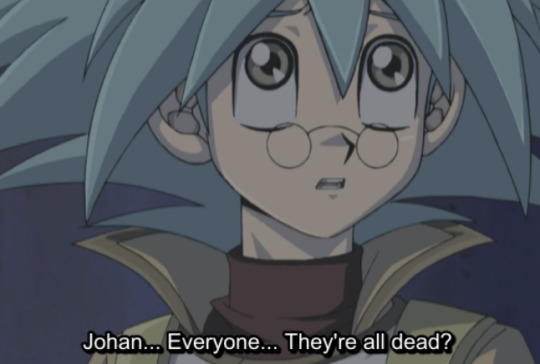
Judai: But at least I avenged them. Sho I'm really glad you're alive. Sho: Those words... they're just lip service. Bro... bro, you're selfish. Before now, I thought of you as the sun. Someone who gave others energy and made the impossible possible. But, I was wrong. All you care about is getting your way. You don't care who you sacrifice. You'll do anything in the name of your goal. Avenging them won't bring back the people you sacrificed. You're just dueling to satisfy yourself. Judai: O'brien! Austin: I thought I told you to wait. Judai: Are you saying what I did was wrong? Austin: Think it over for yourself. Judai: Why? What did I do that was so wrong? I... I did the right thing! And yet... everyone keeps leaving me! What... What is wrong with me? Supreme King: Yuki Judai. To be willing to be evil to defeat evil. This world exemplfiies survival of the fittest. It must be ruled with power. Judai: Power? I don't have that much power... Supreme King: You hold the Super Polymerization card in your hand. Defeat the spirits that stand against you. Breathe their lives into it and complete that card.
After this point Judai decides to sacrifice everything else for power, and to complete the Super Polymerization card he's already sacrificed four friends four.
It's the culmination of an arc where Judai's only been praised for his strength and his ability to win duels. Where he constantly has been called to win duels to solve problems, until that stops working. When everyone is gone, all that's left is his strength. He had to keep winning to keep people safe, but even that wasn't enough, he was still missing something.
He knew he was missing something, that there was something wrong with him and he didn't know where to look.
Conclusion?
He needed power. If he had power, then he wouldn't have lost. If he had power then everything would have turned out alright. He didn't have the strength to carry everyone's burdens for them, that's why he lost, so what he needs is more power. He's been demanded to win, win, and win again so now winning is all that matters.
Now we have our second question: Is Judai's hero complex a good thing?
That's a definite no, because the pressure to always win, to always save everyone and carry their responsibilities has now completely broken Judai. To the point where he now believes that the only thing good about himself is that he's powerful, but he now is willing to sacrifice others to gain more power.
My name is the Supreme King.
Now here's the best part about Judai actively having a villain arc.
He does bad thngs. He does a lot of bad things.
It turns out when you're abandoned and left alone to suffer you do bad things, crazy that, I'm sure Yubel would have a lot to say about that.
Judai is also not being possessed in this scenario. They state it several times. You could say he's Shadow possessed in a Jungian sense. The supreme King is the symbolic embodiment of all of Judai's flaws that he's been ignoring until now. You could say Haou is representative of Judai's subconscious that has been repressed for so long until all those flaws finally surfaced, and that the Judai we see on a day to day basis is his ego, that the relationship between the two is a metaphor for conscious and subconscious.
Jim does a deep dive into Judai's mind, where we're shown a symbolic sequence of what the inside of his head looks like. Judai witnesses his friends appear in mirrors before they shatter one by one, all while he mumbles about how he needs to get stronger.
These are all storytelling devices to show Judai's fractured psyche, but Judai is still in control of his actions. Judai talks and responds to questions when he's addressed. Judai's friends confirm that it's still Judai, he's not a puppet or possessed.
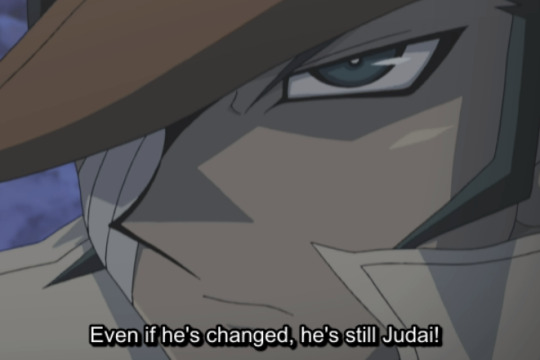
Misawa says later to Judai's face that he and the supreme king are the same person. Judai later is able to use the Supreme King's powers and maintain complete control, because the Supreme King isn't a split personality. Judai even says when Amon is sacrificing someone he loved for power, that he was doing the same thing as the Supreme King, sacrificing everything for power.
We later learn that the ritual that sacrificed four of Judai's friends was a part of Yubel's schemes, but that's the only thing Yubel set up. Judai made every bad irresponsible decision that led to his friends being captured. Judai was the one who snapped and decided to complete Super Polyermization after it was completed. Learning Yubel was behind the sacrifice ritual doesn't take away any agency from Judai at all, because Judai is responsible for his own decisions.
What it does do is create another parallel between them, because we learn the reason Yubel set up the sacrifice was to make Judai walk the same path that they did.
Judai is hurt, abandoned and isolated and in that situation he ends up lashing out at everyone around him in a similiar manner to Yubel. When Judai is put through similiar trauma, he doesn't overcome it in some heroic way because he's an innately good person, no he succumbs and behaves in ways that are incredibly similiar to Yubel.
Even when Judai's friends selflessly try to help Judai, he resists them every step of the way. He ignores their constant calls to him, their comfort, and he even fights them. Judai is eventually reached by the efforts of Jim and Austin combined, but they both die in the effort. Judai is saved because Jim and Austin were way better friends to him than he was to them.
Judai is effectively snapped out of his destructive spiral, but he's left alone with the sobering realization of everything he's done and the blood of two more friends on his hand.
When it's time for our hero to finally face Yubel, he no longer has the moral highground. Now when he faces Yubel it's not as hero and villain, they're just two sides of the same coin. Two people who when they were abandoned, lashed out and hurt everyone around them.
The question is no longer can Judai save Johan. The question now is whether Judai can live with the guilt he's carrying within him, and for that matter can Yubel live with the guilt of what they've done now too?
By this point Judai's been completely deconstructed. He's no longer the hero of the story, he's just a flawed person who needs to fix his flaws. He has the choice to live with his mistakes, and the biggest conflict now is whether he's going to save his villain foil Yubel, or strike them down in order to save the rest of his friends (the three that are left).
This also creates a much more compelling reason for Judai to save Yubel. Not just because Judai is responsible for Yubel's creation, but because they've both made the same mistakes, they have the same traumas and the same scars. Jim and Austin were willing to risk everything to save Judai even when he didn't deserve it, and didn't want it. Now is Judai capable of doing the same thing, of reaching Yubel the way he was reached, not for the sake of saving the world but for helping a friend?
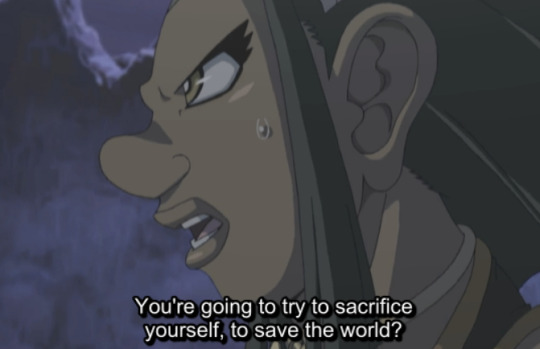
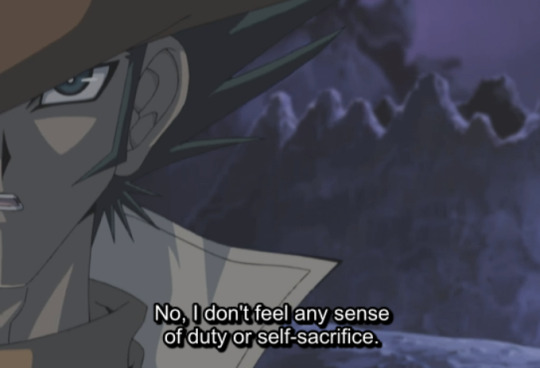
I just want to save my friend. That's all.
This is to me a very compelling setup for the challenge of whether or not Yubel can be saved. Judai's not really saving a helpless victim, he's not acting out of a sense of duty to sacrifice himself for the world, he's being challenged to save someone who suffers from all the same flaws that he does. Judai and Yubel are so similiar at this point it's really just Judai saving himself.
The Dark Deku Arc - Setup
This is the part where I'm actually going to praise MHA. Shocking I know. Season 1 and 2 of Yu-Gi-Oh GX are about 105 episodes in total. The Dark Deku arc begins at about episode 131 with Deku's decision to leave the hospital by himself to hunt down Shigaraki and AFO alone and try to understand villains better.
The 130 episodes up until that point are much better build up, than the first 105 episodes of Yu-Gi-Oh GX. To put it frankly GX is paced like ass. There's far too much filler, and because of that the plot points the anime is trying to make are delivered less efectively. In fact 105 is a good example of what I said above, that ideas are one thing and execution are another.
Season 2 especially is a season filled with good ideas and weak execution due to pacing. Here's one I use as a go-to example. There's a character named Edo Phoenix who's on a quest to find who killed his father. The ending of his plotline is he discovers that in a twist, the man who adopted him is the one who killed his father, and he's been encouraging Edo to investigate because it lets him spy on the police investigation and keep it off his tail.
That's a good twist - however that twist happens in the same episode that Edo's adoptive father is introduced. The audience is given literally no time to even get to know Edo's adoptive father, or get invested in their relationship so the twist doesn't hit at all. A better paced story would show Edo's relationship to his adoptive father early on, get you invested in them, only to pull the rug out from under you so you would feel the shock of that betrayal alongside Edo.
GX establishes its character cast, and yes the filler does give the cast time to breathe and they're all well characterized but because the plot around them is so poorly structured, none of the plot points really hit. Okay, Edo's adoptive dad is evil. Next! You can have good characters, but if you don't put them in a strong narrative framework that challenges them then those characters are just gonna kinda sit there.
The first 105 episodes of Yu Gi Oh GX does succesfully characterize most of the main cast, but it also feels like everyone's just goofing around. In comparison the first 135 episodes of MHA much more successfully builds an escalating conflict. Each new arc either introduces you to a new facet of the world, makes the amin characters more complex, or adds to the conflict.
We basically go from arc 1 "The hero high school is fun" to Arc 2 "The villains are a serious threat" to the Camp Arc "Oh shit, Shigaraki is learning and the villains are getting stronger."
When Bakugo is kidnapped at the end of the camp arc, the tension is ramped way up with the appearance of AFO, and All Might's retirement.
After that point we're introduced to the Overhaul arc, which not only again makes the League of Villains more complex and sympathetic, but also introduces the audience to All Might's more flawed side - the fact that All Might literally worked himself to death saving others and it still didn't work.
Then My Villain Academia -> The Villains are now a threat and they have an army.
Each arc builds on a previous arc, the characters and the world grow more complex, and it feels like you're learning about these complex issues alongside the characters. It just makes Yu Gi Oh Gx look like the silly card games show by comparison, by setting up this very layered world, and conflict, and heroes that challenge the protagonists on what it means to be a hero and what it means to be a victim.
Then all of that great setup.
We are side by side with the proagonist. We, like Deku now want to see if someone like Shigaraki can be saved. We, alongisde Deku want to better understand the villains and learn to see them as people. We want to know if the corrupt hero system can be salvaged.
However, these are too many questions so let's boil it down to two once more, because this is looking at Deku's character.
Deku and Judai are in some ways different as night and day. Deku is an introverted nerd and the victim of bullying, and he starts out with no quirk at all. Judai is a self-confident, charismatic prodigy who instantly seems to charm and befriend everyone around him. Deku desperately wants to be the hero and works his way up there, whereas Judai is just kind of thrown into the school hero because he's the best at dueling.
Judai is kind of a mix of Bakugo and Deku's traits, he's a self confident prodigy who always wins, but he's also someone obsessed with heroes and who has a hero-complex where he's continually forced to save others.
The Dark Deku arc, like the Supreme King Arc looks to take a darker, more introspective look at Deku's character, while also exposing Deku who is a sheltered kid to the a very grey on grey world. It also seeks to deconstruct Deku's suposed "hero complex". Despite the many differences between Deku and Judai I believe the two questions an be boiled down to the same thing.
Is Deku Selfish?
Is Deku's hero complex a bad thing?
These are the questions the series itself is asking in the deconstruction of Deku's character. Deku himself is asking if there's a better way to save villains tha just beating them down or outright killing them, but we'll discuss that later.
Just like Judai there is some setup before this to give a previously very one-note Shonen protagonist mor depth. Deku and Judai are both people who fit the determined, punchy, solve everything fist fight shonen protagonist to a T, on top of being the one to always show up to fight for their friends. Just like in the beginning of season 3, we do have some hints before this that there's something wrong with this attitude. That there's something about Deku that's not entirely there.

There's a flashback of All Might talking with Bakugo where Bakugo discusses that the fact that Deku never takes cares of himself or factors himself into the equation when he always puts others first deeply bothers him and there's "something wrong with it" that's made him always push Deku away.
This flashback also leads into a scene where Bakugo pushes Deku out of the way of one of AFO's attacks, telling him to "stop trying to win this on his own." In an attempt to make Deku see that he's not fighting alone this time.
Deku has also been warned repeatedly about the way his power destroys his own body when he uses it, warnings he's repeatedly chosen to ignore. Saving others isn't just a goal for Deku, you could arguably say it's a method of self-harm and that's what unnerves Bakugo. Bakugo even gave a similiar speech in the past, about how someone like Deku shouldn't take all of the bullying that Bakugo has given him over the years and still try to be his friend afterwards. At this point it's not really like Bakugo's done anything other than tone down the constant insults a little bit, he hasn't apologized or anything but even this early in the manga Deku has a tendency to just let Bakugo's treatment of him go. It's not like they were super best friends forever before the bullying started either despite what the shippers might tell you. Bakugo is saying it's weird that this kid just takes it, and takes it, and takes it without fighting back like he doesn't care about how people treat him and Bakugo is right... that is weird!
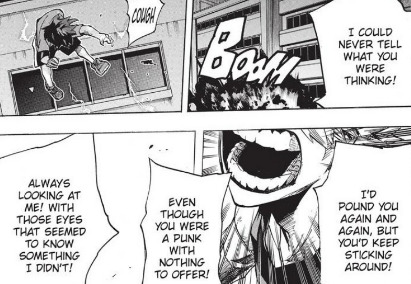
Deku either has such low standards for how he's treated that he just lets Bakugo get away with it, or he just doesn't hold a grudge when he is mistreated because his pain and his suffering just always matters less. Either way it's not healthy, and it could be indicative of a deeper problem hiding behind the surface.
Either way there's setup here, because on one hand you have everyone and their grandma praising Deku for his "drive to save others that eclipses all common understanding."
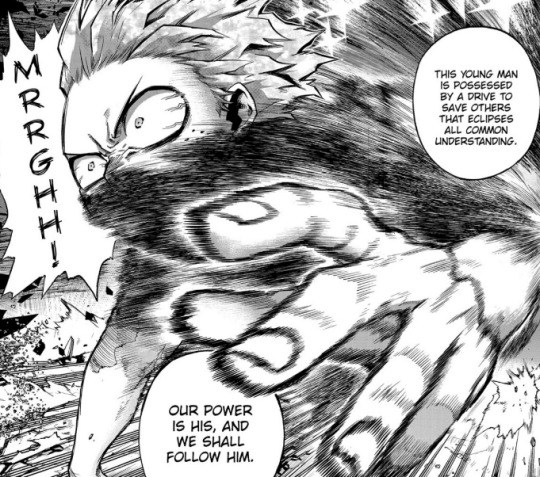
While at the same time he's criticized by Bakugo for having no regard for others. This could be the setup for the character trait that led to his earlier success leading to his downfall later. In Judai's case, everyone praises his purity of heart, but then that purity is later criticized as childishness, naivete and a refusal to grow up.
As for Deku...
How can you protect others if you can't even bother to protect yourself? How can you save others if you can't save yourself? That's the question Touka asked of Kaneki in Tokyo Ghoul when she rightly called out his desire to protect everyone at the Anteiku Cafe as just a roundabout way of getting himself hurt by acting recklessly.
In Kaneki's case he's not trying to protect anybody, he's just picking battles against the doves and getting himself hurt. He's acting out a hero complex in the sense that if he feels like he didn't fight his friends battles for them like Judai then he wouldn't have any friends to begin with. That's why Touka also says "Besides that, everyone doesn't belong to you. You have no business protecting us."
Is Deku fighting for the same reason? Does he harm himself to protect others because he views himself to be worthless and the only way to demonstrate his worth is try and fight to save others?
We don't get an answer for that question. Judai thinks duels are fun, and he's really good at them, and because he's good at dueling he's made friends. He think to keep those friends he has to keep dueling for the sake of others.
Deku's not motivated by the idea of protecting or keeping his friends, that's a secondary motivation. All we have on Deku is that he feels a strong desire to save others, and that he worshipped heroes like All Might growing up but has a naive idea of what a hero is supposed to be. However, his lack of motivation could be the "something that's missing" just like Judai has.
The GX writers did some hardcore digging into Judai's character by focusing on how shallow he was in motivation compared to everyone else, and showing that to be a symptom of his childish naivete.
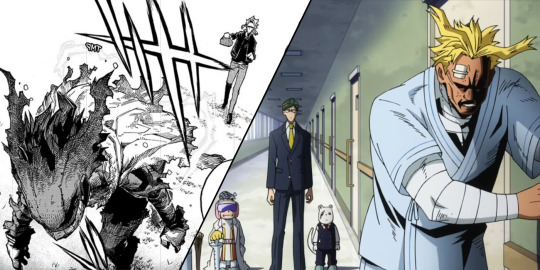
There's also the potential parallel between All Might and Nighteye's breakup, and Deku's decision to leave all his friends behind to hunt for Shigaraki himself.
Even if Deku doesn't have a deeper motivation than just "an unnatural drive to save others" then you could show the effects of Deku walking down the same path that All Might did, the belief that he has to be the one to save everyone singlehandedly and if he rests for a single moment than someone might die, leads to him not only destroying his body, but also doing permanent damage to all of his social relationships.
Even if Deku's motivation isn't too deep, you could still have the traits that led him to earlier success now driving him to ruin as the story punishes Deku for his excessive selfishness.
This is also where we finally get back to Deku's goal of understanding Shigaraki, and contemplating whether or not it's possible to save villains without killing them.
I draw a parallel between this and Judai's enemies calling him out on lacking "darkness of the heart" and that without understanding that darkness he can't win.
Judai's lack of darkness of the heart means two things, he's not mature enough to understand the reason why his enemies are fighting, and he's also not mature enough to se the darkness in his own heart which is why he ends up blind to his own flaws and making pretty severe mistakes later on.
For Deku, it's mainly a lack of understanding of the motivations of the villains he's fighting again, villains he's only ever really beat down with his fists until now.
However, for Deku lacking darkness of the heart you could also re-contextualize that as meaning because of his idealization of heroes he's never once looked at the darker sides of hero society that might have driven people into becoming villains.
Deku's lack of inner darkness may just come from the fact that compared to the villains he's fighting against, he's gotten to live a pampered life. Without understanding that darkness, he can't be a full person because he'll still be a naive sheltered child, and not an adult wise to the way the world works and the moral greys he inhibits. Either way, it's just as necessary for Deku to gain an understanding of "Darkness of the Heart' as it is Judai.

So here's all the setup for the start of Deku's Dark deconstruction arc. As different as these characters and scenarios you can still boil it down to those three narrative questions about Deku / Judai, is there behavior selfish? Are there hero compelexes a good thing? Do they need to understand darkness of the heart?
Before moving on I'm going to summarize Deku's setup as thus:
Deku's actions are selfless.
Deku's motivations are also selfless (a desire to save others).
Deku does not benefit from saving others in any way, if anything he actively harms himself in order to do so.
Bakugo finds this behavior incredibly disturbing.
All Might destroyed his body and burned all bridges because of similiar flaws to Deku.
So the answer to the first question is Deku selflish? No. Is his hero-complex a bad thing? Potentially.
While Deku himself decides that he needs to understand darkness of the heart in order to better understand villains. Deku is actually more set up to contemplate darkness of the heart than Judai is, because Judai charges into the dark world blindly with only the motivation of saving Johan not even caring for Yubel, while Deku has the explicit motivation of trying to understand the little boy inside Shigaraki.
DEKU LEFT THE HERO ACADEMY
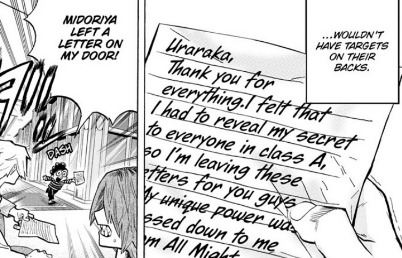
Deku begins the arc by leaving alone to go searching for Shigaraki, with hand-written letters addressed to all of his friends that tell the truth about One for All and also say Goodbye. He makes the deliberate decision to leave them behind so they don't get targeted alongside of him. It's a pretty classical superhero motivation, I need to cut myself out of my loved ones life in order to protect them. Of course this sort of ignores that everyone in his class has super-powers too, but you know heroes they're all such drama queens.
Is this selfish behavior?
This is going to be the only time I'm going to solidly answer yes. Deku clearly did not take his friends feelings into account. His desire to protect them, is more important than their own agency. They also might want to fight alongside him, they'd be upset if they saw him die or get hurt trying to protect them. Deku thinks of his own feelings of wanting to keep them safe and not being able to handle the emotional burden of protecting him, more than he does their own personal feelings.
This is also something that All Might did they permanently burned all of his bridges with his sidekick and friends, and deeply hurt his sidekick who was just asking him to take a break so he did not get himself killed and quit because he didn't want to watch All Might slowly kill himself by inches.
Deku is being selfish here, and later on when he does face his friends he even acts pretty condescending belittling them and insisting they can't fight on their own or keep up with him.
However, I need to ask a secondary question.
Is there any lasting consequences for this selfish behavior?
Besides the fact that it hurt his friends feelings for a little bit, no. I spent a much longer time covering this in Judai's sections because Judai's selfish behavior led to character conflicts. Judai disregarding his friends led to everyone starting to resent him in the Dark World, and their once tight-knit friend group further falling apart.
Judai on three seperate occasions makes impulsive decisions to run ahead without consulting with the group. The second time he outright lies to the group and sneaks ahead without them. THe second time all of his friends are captured when they go after him and try to follow him to give their support because they're worried about him. The third time he makes the decision to run ahead, he knows about the danger they're in and the risk of getting captured and he just blatantly ignores them. When Austin notices they're missing Judai doesn't even go looking for them because they're not a priority at this point - saving Johan is.
This is something that has very real and lasting consequences in the story, they're captured because of his recklessness, and sacrificed in front of his eyes. Even though they technically come back in season 4, the trust between Judai and his friends is all but gone and he's alone for a lot of Season 4.
Judai's decision to abandon his friends has direct and lasting consequences. He is being punished for his hero complex. Running ahead, and fighting alone against the bad guys is what Judai has always done and what's worked before, but now in a more complicated world it's not cutting it and Judai is being challenged for his flaws.
Deku hurts his friends feelings a little bit, but even in that case the focus is on how sad it is for Deku, how hard it must be to be a noble hero fighting alone.

Deku's Mary Jane and Spiderman bullshit never impacts his friends directly, other than the fact that they find it slightly condescending. His "I need to keep secrets from my loved ones attitude" is challenged because his friends want to fight alongside him, but there's never any narrative punishment delivered to him. It's just solved with one fight scene and a character holding out their hands. Whereas, the consequences for Judai's rash actions last two seasons.
I call it "Mary Jane and Spiderman" Bullshit, because Spiderman keeping his identity a secret from all his loved ones is a big conflict in the comics. Something that got Gwen Stacy killed, because Peter Parker never told her his identity in order to protect her, and then that just ended up with Norman Osborne finding out about her anyway and kidnapping and killing her.
You might have heard of the "Death of Gwen Stacy" it's a pretty famous moment in comics. It's also a case where it shows that the Hero's failure to communicate honestly with their loved ones in the name of "Protecting Them" can actually get them killed.
There's even consequences in MHA itself for heroes choosing to sacrifice their personal lives to help complete strangers. Shigaraki literally made a whole speech about it. Kotaro Shimura is traumatized for life over his mother's decision to abandon him instead of giving up on being a hero. Nana Shimura believed she was doing something selfless in sending her child into foster care to keep him out of AFO's clutches, but that was shown to be wrong as AFO just found Kotaro's household and then destroyed him later on in adulthood anyway.
So in the story we are shown scenarios where choosing to abandon your loved ones in the name of "protecting them" can have disastrous and lasting consequences, but as for Deku himself, the decision to leave the school has basically no consequences whatsoever.
Well, Deku making the decision to fight alone is something that might lead to some consequences. After all, Judai's breakdown came about because he always felt the pressure to fight alone and carry everyone's weight on his shoulders until he couldn't.
Perhaps, with Deku fighting alone to protect everyone we'll reach a similiar breaking point. Just as Judai couldn't handle carrying everyone's burdens, looking for Johan, and leading his friends into the Dark World all that the same time and eventually broke down maybe we'll see Deku break down because he just like All Might can't carry the burdens of an entire nation - oh wait nevermind he's working with the Top 3 Heroes.
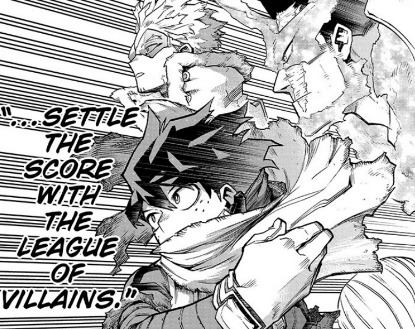
Even the premise that this is Deku leaving the school, to become something like a vigilante wandering the countryside trying to fight AFO on his own is just incorrect because Deku is receiving government assistance right now.
In the Dark World it was really just Judai and his friends, so every single bad decision Judai made had consequences because they were well and truly alone. Deku has backup so he's not even really "alone" in the arc that's supposed to be about him fighting AFO and trying to understand Shigaraki alone.
ALL YOU'LL FIND IS BLOOD AND VIOLENCE
Let's briefly focus on questions two and three, is Deku's hero complex bad, and does Deku need to understand darkness of the heart?
Judai's hero complex was based on the idea that if he wanted to have friends he needed to fight for them and solve their problems for them.
Judai got in such an unhealthy negative feedback loop, that he had to carry his friends burdens in order to maintain his friendships with them, but at the same time he couldn't receive any help from them because he made their friendship all about him carrying their burdens. He was operating underneath an amazing pressure to always win until he lost. The very thing he did to try to maintain his friendships, keeping his friends at arm's length and fighting alone is exactly what ends up driving them away and leaving him alone.
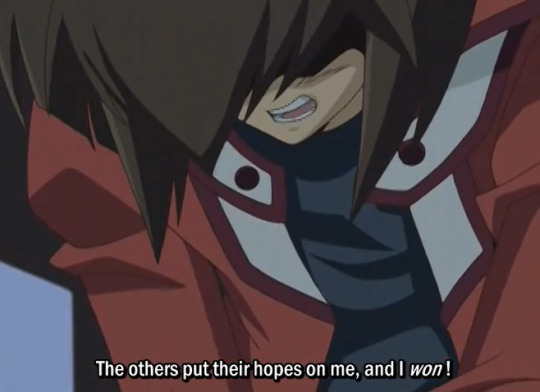
But, still...! They're all... They're all gone. There really was something missing in me. But what is it? What was missing? What should a duelist burden themselves with?
Judai paradoxically fights alone in order to keep his friend group together, which only ends up with him losing four friends and being abandoned by the rest when they're disappointed for him in his selfish behavior. Judai screams out why, realizing he did something wrong here, that something went wrong because he's been winning duels, he's been fighting the same way he did before only to end up with the worst option possible. The realization that he is truly alone breaks him down entirely.
Judai's hero complex unwravels when simply charging ahead to fight doesn't work for him anymore, because the situation becomes more complicated than that. Darkness of the heart can mean many things. Judai not understanding his own personal flaws. Judai not seeing how his flaws are affecting others. Judai not looking at other people's emotions, he doesn't hear or respond to criticism when his friends start trying to tell him how is selfish decisions making is making them feel.
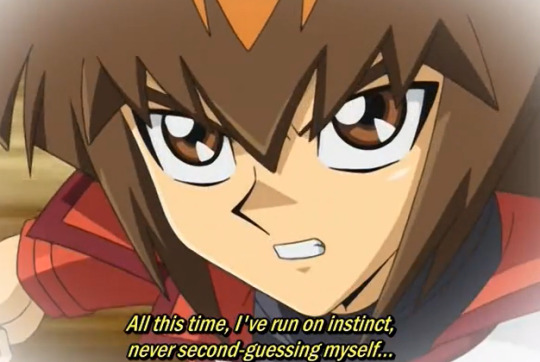
I can't just stay and wait. All this time I've run on instinct, never second-guessing myself. If I just stand still now... I'm sure I won't be able to start running again. And I won't be able to get to Johan.
Judai's hero complex has a clear source - he believes he has to keep running ahead and fighting for his friends the same way he always has in order to keep those friends and if he stops he'll lose everything / succumb to the guilt he now feels about being uanble to save Johan. His Hero Complex also has clear consequences, him running ahead without thinking gets all of his friends kidnapped and used in a sacrifice ritual that could have been avoided if he had made different choices.
Spiderman kills Gwen Stacy because Peter Parker deciding to not tell her about his secret identity to protect her backfired and made her an easy target to the Green Goblin.
Heck, Spiderman's entire character is about how the burden of being Spiderman and his Hero Complex constantly sabotages any attempt he makes at having a personal life. Miguel O'Hara's catchphrase in the incredibly popular Spiderman movie is that "Being Spiderman is a sacrifice" and he's not wrong either.
SO, is the narrative punishing Deku's hero complex in any way?
Well, the one warning he did receive that if he kept fighting he'd lose permanent loss of his arms turns out to not matter anymore because his body is just stronger now.
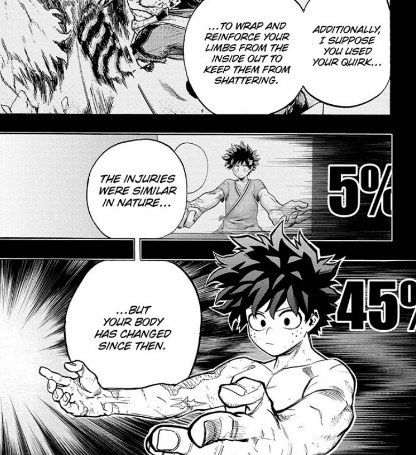
So, even the phyiscal toll of fighting alone that's a consequence for Deku doesn't actually apply here.
I keep talking about consequences but what do I actually mean? Am I talking about strictly punishment? Do bad things need to happen to characters in order to get their lessons?
Not necessarily.
When I say "consequences" I mean in terms of actions always having consequences in a story. The best stories are succinct, that means you basically cut down in as many frivolous details in a story as much as possible so everything that happens onscreen is something that matters and contributes to the whole. Therefore, every action should have a consequence directly seen onscreen in story. Stories are all actions and consequences, the choices the characters make should have direct impact on the plots and the other characters because it makes those choices seem like they matter.
If the story constantly draws attention to the fact that Deku is afraid of ducks, but the story takes place on the moon and there are no ducks living on the moon then that's a wasted plot thread because there are no consequences. If a character does something bad, other characters should discuss it, or it should negatively impact them in some way.
When Judai decides to run ahead without all of his friends for the first time after they all agreed on a plan, the result is the next episode they all start talking about their shared doubts with Judai when he's not around. If they all just swept Judai abandoning them under the rug, then Judai running ahead and leaving the others alone doesn't feel like an impactful character flaw.
There's no lasting consequence for Deku's hero complex. It doesn't drive him to any kind of breaking point like it does Judai.
I think the reason why is because there's no real moment of failure for Deku. When he tries to ask Muscular why he fights, and Muscular rejects him and says that he was just born evil and has no deeper motivations, Deku's not frustrated at all.
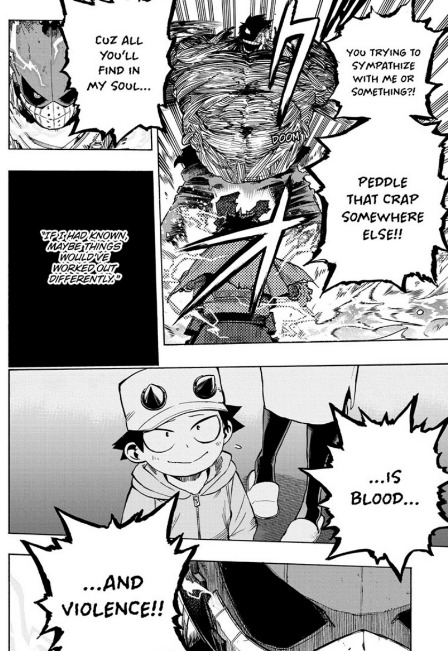
Deku who feels a "unnatural desire to save others" isn't really bothered by the fact that Muscular insists that he can't be saved and that they can only fight. Despite this technically being a failure, Deku has failed to talk a villain down, failed to find a way other than fighting and also failed to understand the darkness in someone's heart it's of little consequence because it's not framed as a failure.
Deku just punches Muscular, back to the drawing board.
There's another manga called Choujin X running right now, where the main character is on a similiar quest trying to see if there's a way they can save the big bad Sora Shihouhin, and when he is forced to fight against a villain who won't back down, de-escalate, or listen to reason he has a complete emotional breakdown.
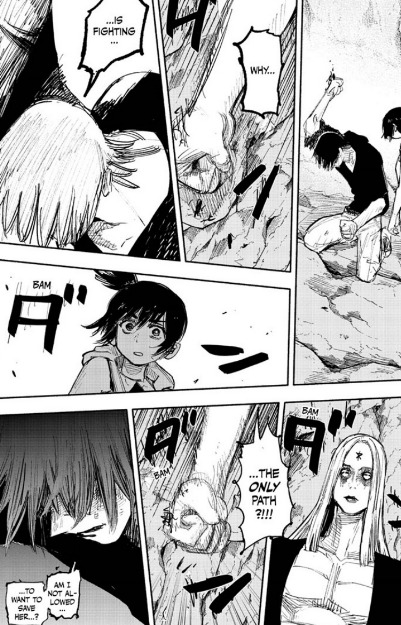
This is the reaction of someone who's genuinly invested in the idea of saving the villain, and frustrated with the reality that he might not be able to save her, that he can't talk to the villains or convince them to back down. Tokio's not even characterized by an unnatural desire to save others like Deku is, so why is he the one breaking down and not Deku someone apparently so selfless that he wants to save the mass murderer that's trying to destroy society?
If Deku's desire to save others is so strong why doesn't he show frustration at being unable to talk down, or understand Muscular?
Judai is stuck in a negative feedback loop where he's forced to fight for others, because he believes he has no worth to his friends otherwise. All we're told of why Deku feels the need to save everyone around him is that he's just like that, he just feels like saving everyone no matter who they are the moment they come into view.
If we're choosing to characterize Deku that way, then number one he should be attempting to save everyone, and number two the stress of having to save everyone is something that should get to him. His "Hero Complex" should be what's breaking him down at the moment. The unnatural desire to save everyone around him that led him to so much success should be what's punishing him this arc.
Judai felt pressure from two aspects, first the pressure to carry everyone's burdens, and second the lack of understanding of darkness of the heart. Unlike Judai who doesn't want to understand darkness and who avoids it as long as possible, Deku goes into this arc actively seeking to understand how his villains think.
Deku and Judai also suffer from a lack of darkess in their own hearts. This leads to them having empty motivations. Judai has a childish desire to enjoy fun duels. Deku has a childish desire to save everyone. Neither of them have tried to grow or change or even question those motivations in any way and because of that they're stunted people.
Judai doesn't know why he fights. He doesn't question why he fights. He just takes on the burdens of others to give him something to fight for. This all together leaves Judai blind to his own personal darkness, and also because of that blindness he can't grow in any way because he never evaluates himself, he never looks at himself and tries to change.
When he's on his knees and at his breaking point he screams at the top of his lungs, "WHY? WHAT AM I MISSING? WHAT DID I DO WRONG?" simply because Judai's never thought about these things.

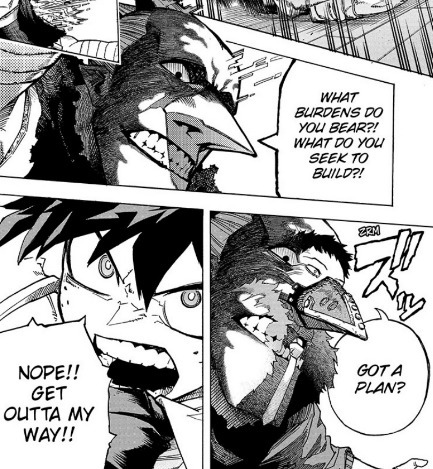
Deku's asked these same questions both in the Dark Deku arc, and hundreds of chapters later he's asked what he's planning on doing as a hero in order to make things better and Deku never materializes an answer.
Pre-Dark Deku Arc, during Dark-Deku Arc and Post Dark Deku arc, Deku always solves his problems by recklessly jumping in and saving others. There's never any point where he's punished or criticized for this behavior in any significant lasting way. He never has to self reflect and develop a reason on why he wants to save others, or eve think about how he's going to save others, he can just keep acting as the rash, impulsive hero.
Judai and Deku are both characters who are empty, and lacking in motivation but Judai is ruthlessly criticized for that until he reaches his breaking point and is forced to look at his motives.
This once again comes from a lack of failure on Deku's part. Deku never fails the way that Judai does. There's a scene where you could have easily had Deku fail. The entire Nagant vs. Deku fight where Deku fails to give her any substantive answers to his questions.

Imagine if Deku's simple philosophy of always extending a helping hand failed here. Imagine if Deku actually got deeply ivnested in the idea of saving Lady Nagant, and did his beset to talk and reach out to her but his answers weren't enough and because of that she just chooses something like suicide. Imagine he has her by the hand, and she's dangling off of the roof and he thinks that his impressive move to save her should have been enough - he's reached out a hand like always. He thinks this should have won her heart over, by showing her that someone still cares in all of her despair.
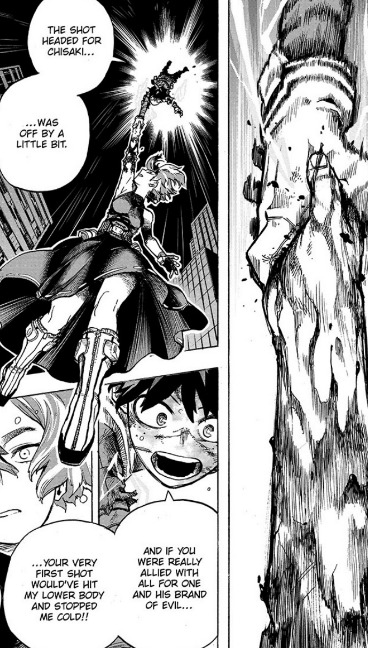
Then, Nagant in one final spiteful move lets go. The person he heard her entire backstory, the person maybe he once was a huge fan of her when she wasa hero, the person he wants to save the same way he wants to save Shigaraki chooses to let go and fall to her death because dying would be better than living in whatever kind of corrupt world that Deku is trying to build.
This could be Deku's Gwen Stacy moment. Spiderman carelessly webs Gwen Stacy whe she's falling to catch her and for a moment he thinks he's saved her because he's overconfident and has caught people falling like this a thousand times, only to find out he's snapped her spine. His overconfidence, his hero complex making him believe everything magically would work out led Gwen Stacy to her death. This could show the simple act of just offering a hand out to someone in need isn't enough, without empathy and understanding.
Instead, AFO just blows Nagant up in Deku's face.
Except, that isn't even a failure bcause Nagant turns out to be just fine! There's no point in blowing up Nagant except for the spectacle of it, because she turns out to be fine five minutes later and even shows up to fight in the next arc.
There's no consequencs to anything that happens in this scene. Deku doesn't suffer any consequences for being blind to the faults of society. (He's working right alongisde a killer cop just like Nagant and he doesn't even care.) Deku isn't forced to reflect on what saving people or making society better would even mean. He also isn't punished for his lack of understanding the way that Judai is.
Afterwards, Deku denies help to a very mentally-ill Overhaul, who is apparently not one of the villains that Deku wanted to save. There's a whole buch of asterisks on that "Deku wants to save everyone***" goal. This also isn't framed or used to paint Deku in a bad light because Overhaul is unworthy of salvation in Deku's eyes for hurting Eri.
Is this action part of an arc? Is Deku reaching his limit with trying to sympathize with villains only to see people like Overhaul and Muscular fighting him every step of the way and telling him they don't want to change?
Nope, this scene is never brought up again.
Deku never fails, and he never does anything wrong. Even when there are situations where you could argue he does do soemthing wrong, like denying the armless, mentally ill Overhaul help - he's not painted as being in the wrong.
The entire arc is supposed to be about criticizing the protagonist for their hero complex, and their lack of understanding of the darkness of the world but for Deku there's no criticism to be had here.
Compare this to the sacrifice ritual in the Supreme King Arc, where not only does Judai fail to save his friends, but the friends that survive ruthlessly tear into him aftewards for his selfish behavior. THe actions of one protagonist matter, have consequences in the story and are criticized. The actions of another protagonist have no real consequences and are never criticized.
The whole mansion blows up and... nothing happens. No one's injured in the explosion. It may as well have not happened in the story because there are no consequences for Deku just continually choosing to blindly run ahead like his hero complex tells him to.
There's evena moment where Deku winds up in a similiar situation to the dark ritual. After receiving information from Nagant, he blindly wanders into a mansion in Haibori woods believing it to be AFO's base, only to find out it was a trap and AFO was waiting for him to blindly charge in all along.
THAT'S WHAT MAKES US HEROES AND VILLAINS
This is where I'm going to talk about another big similarity between Deku and Judai, and also the biggest point of divergence in the Dark Deku and Supreme King Haou arcs.
Deku and Judai are both character foils with Shigaraki and Yubel respectively. This is where I'm going to praise MHA again, surprising everyone.
The foiling between Shigaraki and Deku is masterful. They both started out in relatively the same place, as boys with dreams to become heroes who were softly told no by their parents. Tragedy struck Shigaraki and he killed his family on accident and wound up alone wandering the street for days until he was found by AFO.
They're both the students of the greatest hero and villain of the last generation. They both end up being surrounded by a group of close Nakama that they want to protect. They're both continually challenged to grow up, and show how they're going to be better than their predecessor for the hero and villain sides respectively. They both have to prove they are worthy successors. Shigaraki has all the heroic spunk and determination that Deku has but on the villain's side, and while Deku loves heroes, Shigaraki is hero society's critic wants to bring down the hero system that didn't save him.
You get the feeling that Shigaraki really is Deku just in a different situation, a same person on the opposite sides of the conflict kind of character foiling.
As the biggest Yubel stan here, in some ways the foiling for Shigaraki works better than the foiling for Yubel because Shigaraki isn't just Deku's foil, he's the foil for all of society. Yu-Gi-Oh Gx takes place in a society run where everything centers around card games, it's not really that deep. In My Hero Academia you have that 100 episodes of great setup where Deku is not only learning to look at the darkness within himself, but also the darkness within hero society around him.
Judai's narrative as much as I love it, is entirety about Judai.
Not only could Dark Deku arc develop Deku's character, it could also say something deeper about the world it's taking place it, because Deku has all these connections to Shigaraki, who also kind of represents the orphaned boy failed on all levels by the society around him.
Shigaraki is the shadow of -> Deku, but also Shigaraki is the shadow of -> all of society.
Yubel is the shadow of -> Judai, and only relates to Judai's personal growth.
Yubel is Judai's personal villain, and was created by his actions as a child. His decision to abandon Yubel into space, led to Yubel being tortured and their later madness.
Yubel is also Judai's shadow. They carry all the same flaws, but those flaws are obvious in Yubel and repressed in Judai. Yubel's belief is that Judai is someone who purposefully enjoys hurting their friends, and that's how he shows his love. While that's twisted it's not hard to see how Yubel came to that conclusion. After all, Yubel loved Judai so much only for Judai to abandon them and turn a blind eye to their suffering. In the Dark World, Judai abandons his other friends continually in order to search for Johan, and they wind up suffering too.
While Judai doesn't sadistically enjoy hurting others as Yubel put it, there's an element of truth to Yubel's criticism. Judai does abandon people, Judai isn't as empathic as he seems to be. When Judai is subjected to the same kind of isolation and abandonment that Yubel has endured for the past ten years, Judai loses his mind a whole lot quicker and starts lashing out at everything around him the same way Yubel has. Judai without the love of his friends starts to hurt everyone around him in his lashing out, the same way that Yubel desperate for love starts to inflict pain on the people she loves. Even before the ritual happened, Judai was unwittingly hurting his friends with his own selfish behavior.
Yubel's stated criticism is "of Judai is "Anguish and sorrow born from loneliness. That is the nature of love as you taught it to me" and further beyond that "When you forgot about me, I suffered. It's hot. It hurts. I am in pain. Why? You know how much I love you? Why did you do this to me, Judai? In that moment I realized that was how you showed love. Because you loved me, you hurt me and made me suffer."
That sounds crazy, but hasn't Judai been hurting the people he loved for his own selfish reasons this entire arc? Is it that crazy then to conclude that neglect and abandonment must be how Judai treats everyone he loves, so surely he loves me.
One of the biggest criticisms of this arc is how Judai's behaviors impact his relationships, so of course his most personal villain and foil is his jilted ex nonbinary dragon lover. On a less joking note, when Yubel was displaying troubling behavior as a child, Judai's first response was to abandon them. Which is ironic for someone like Judai so paralyzingly afraid of being abandoned that he became everyone's workhorse and worked himself to death solving their problems for them. Who when abandoned by those friends finally, snaps just as hard as Yubel did when they were abandoned.
Do you see the parallel I'm drawing here? Judai is slotted into the spot of the protagonist who's friends with everyone he meets, who loves and fights for his Nakama. Yet under closer scrutiny he's shown that he doesn't really understand what love or friendship is or how to give and receive love from others in a healthy way. His antagonist is his former childhood best friend, who is obsessed with love and demands that Judai love them back. Judai's lack of understanding of relationships and love takes a dark twist with Yubel, their shadow, foil and antagonist.
These are once again very personal challenges to Judai, society doesn't really factor into this equation. Though, Judai is somewhat challenged as a hero because there's an irony to Judai plunging into the world to save his best friend Johan who he's known for like three weeks, but not really lifting a finger to save the antagonist of the arc Yubel who he's known since childhood and is personal responsible for putting through torture.
That hypocrisy there too, is a personal challenge to Judai that paints him in a less heroic light. He wants to save Johan and ignore Yubel because it's easier, because saving Johan relieves him of his guilt. He doesn't even know what to do about Yubel, so he doesn't try and falls back on his previously established behavior of playing the hero.
The hero is really just a mask for Judai at this point, something the story has ripped right off of his face by the time it comes to face Yubel.
There are two ways in which Yubel serves as an ultimate foil to Judai.
Yubel acts like a callout post to all of Judai's flaws
Yubel represents a dark path Judai could have taken.
This second one is what Shigaraki and Deku have in Common with Judai + Yubel. There's something deeply tragic about the idea that while Deku was making friends, getting taught by a loving teacher like All Might, Shigaraki was all alone being pushed by a ruthless manipulator like AFO into becoming the worst villain.
Judai and Yubel's lives follow the same tragic parallel path. They began in the same place as childhood friends, but after abandoning Yubel, Judai spent the next ten years growing up, making friends in a healthy and safe envirnoment while Yubel the one who was abandoned was alone in space desperately crying for Judai to come save them only to be ignored because Judai has long forgotten them.
However, there's a striking difference there too. Yubel is created directly by Judai's neglect and actions. Whereas Shigaraki is created by the neglect of all of society, it's not Deku's fault directly.
#1 Shigaraki acting as a callout post to Deku's Flaws
However, this is where Shigaraki's callout post comes in. Shigaraki gives a long speech on how the existence of heroes itself, creates villains like him.
"You heroes pretend to be society's guardians. For generations you pretended not to see those you couldn't protect and swept their pain under the rug. It's tainted everything you've built. That means your system's all rotten from the inside with maggots crawling out. It builds up little by little, over time, you've got the common trash all too dependent on being protected. And the brave guardians who created the trash that need coddling. It's a corrupt, vicious, cycle. Everything I've witnessed. This whole system you've built has always rejected me. Now I'm ready to reject it. That's why I destroy. That's why I take power for myself. Simple enough, yeah? You don't understand because you can't understand, that's what makes us heroes and villains."
To break it down simply, heroes look away from the faults in their society, they intentionally ignore the people they cannot save, and when those people turn into villains the heroes beat them down hard. The villain attacks then convince the common people of the need for heroes, and the cycle perpetuates itself. This is all powered by the people's blind, uncritical faith in heroes.
Deku is a person who has that same blind, uncritical faith in hereoes, and until this point has never thought of Shigaraki as anything more than a villain to be punched until he stops. Which is why this is still a callout post that applies to Deku, because Deku's blind admiration for the Hero System is part of the problem that enables the very flawed hero system.
Deku does not understand darkness of the heart, therefore Deku does not understand that heroes could possibly be bad, and he could possibly be supporting a bad system until he's slapped in the face with it.
However, is there a lasting consequence for Deku's blind support of the hero system?
Nope.
I just described up above what could have been a consequence, if Lady Nagant refused to have faith in Deku since he didn't back his words up with action.
Deku also clearly does not want to break away from the corrupt hero system that created Shigaraki, because the heroes that he brought along to fight with him are Endeavor, Hawks and Jeanist, a child abuser, a state sponsored murderer, and a guy who makes bad puns. He doesn't change any of his bahavior that enables the corrupt system to stay in power.
Not teaming up with the Top 3 heroes, and deciding to go full vigilante would have at least have been breaking away from that system.
This circles around to a big underlying problem in this whole arc in that Deku isn't really doing anything different from what he was doing before, and he's not punished for his character stagnancy either.
So we're left with.
#2 Shigaraki represents a dark path that Deku could have Taken
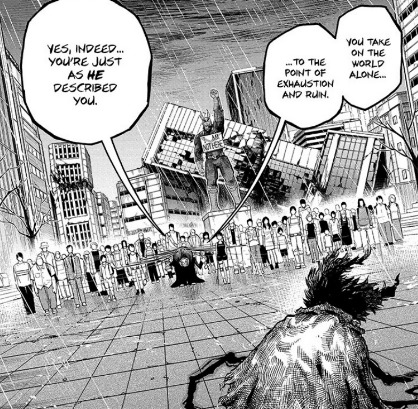
This is where Judai / Yubel succeeds and Shigaraki / Deku falls flat on its face.
When pushed to his absolute limit after failing repeatedly, Judai snaps. With no friends left he decides that all that matters is power. This path seems natural for him because we've already seen what being abandoned and left alone can do to a person and how it twisted Yubel. The story hints again and again at Judai's blood knight tendencies, and that he thinks the only thing he has of value to offer others is strength by fighting for them.
He loses his friends and the fighting is all he has left.
At the point of despair he decides to just embrace power. If he cares about nothing more than strength, at least that will give him some sense of control over his life after the out of control tragedy that happened to him.
"Yuki Judai. In order to defeat evil, one must become evil. In a world with the law of the jungle at work, one must rule with power." "Power? I don't have that kind of power." "In your hand lies the super polymerization card. Defeat any spirits who may oppose you, and combine their lives into it to perfect the card."
Supreme King is just a villain persona that Judai adopts to as a protetive blanket for all the hurt and pain they've gone through, just like ding, ding, ding, the villain persona Shigaraki Tomura is for Shimura Tenko.
Judai snapping under such intense pressure shows us that if even the faultless hero can snap, then how much can we blame the villain for snapping under similar circumstances? Maybe the reason both the hero and the villain fell is because they're both equally human and to fall down is human.
Deku never falls down as hard as Judai does. He doesn't even fall down and scrape his knee. There's no instance where he fails to save anyone. There's no instance where his actions hurt anyone. There's no instance where he takes things too far and hurts a villain. I kow it's unlikely for Deku to turn into a villain, but he could have at least gotten so frustrated he turned into a punisher style vigilante! Is that too much to ask?
There's not even a single moment where Deku goes too hard in a fight and injures or even kills a villain. They could have pulled an "I thought you were stronger" moment like in Invincible.
I don't know why this is called the Dark Deku arc because there's no darkness in Deku's heart for him to exploit, nor is he actually called to better his understanding of the darkness in others hearts. Judai understands Yubel's darkness because by the end of his personal arc he's been there, he's not the hero he's the atoner. He can either punish Yubel, or hold a hand out to help Yubel atone.
Deku's arc might as well be called the "My Little Pony Friendship is Magic Arc" because he never does or confronts anything dark. His worst crime is not showering. All that isolation and his repeatd failures in hunting AFO down should have worn Deku down, but it didn't because he's just that special of a boy!
Deku's hero complex also is completely uncriticized from beginning to finish. Judai's hero complex is an unhealthy behavior that utterly destroys him. Deku's hero complex is a job interview flaw.
FRIENDSHIP IS MAGIC
Just to hammer my point in I'd like to compare these two scenes. One is in the middle of the Supreme King Arc, the sacrifice ritual scene where all of Judai's friends are blaming him for the fact that they're about to be sacrificed while he's still trying to save them.
The second is the climax of the Dark Deku arc, where all of Deku's friends are showing up to fight him and convincing him to accept their help.
Just look at how vastly different these two shows treat their shonen protagonists when it comes to his flaws.
For the ritual sacrifice scene. This is immediately after Manjoume wakes up to find that he has been chained and kidnapped with Judai standing right there.
Judai: Sit tight! I'll save you soon! Manjoume: Wait, is he dueling? JUdai you damned idiot! Weren't you going to save Johan with us!? Getting yourself all flared up. You didn't even stop to think about us at all, did you? Judai: That's not it. Manjoume: That's just how you are! You were the only one in your kingdom from the get-go. We were the idiots for getting all motivated with you and feeling some sense of friendship with you being like that!
Then Judai watches helplessly as Manjoume dies. His other friends don't fare much better.
Kenzan: Big Bro? Why'd you want to save Freed's comrades when it meant sacrificing us-don!? Judai: You're wrong. That's not it. Fubuki: It's painful. This pain isn't just physical. It's the pain of a friends' betrayal that I have tearing my soul. apart. Asuka: I'm being betrayed and sent away by you. To think that I'll have to bear a sadness like this.
All of Judai's friends die spitting on him and telling him what a terrible friend he is and that this is all his fault. Which it is, because his decision to abandon them got them captured and led up to the sacrifice ritual.
Now, what scathing criticisms do our heroes have to give Deku after he left them all behind to fight Shigaraki alone?
Denki: Midoriya! We get that all for one is really importnat but you got something even more important in your life! Me and you we aint'g otta ton in common, but you're still a friend! Even if we gotta force this friendship down your throat. TodorokI: What a look you have on your face. Is this resposnibility so much that you can't let yourself cry? Seems like a burden you should share with the rest of us. Uraraka: The thing is Deku, we don't want to be protected by you and reject who you are and what you're doing, we just want to be with you (this part is narration).
Deku is told that none of his friends are mad, they want to be by his side no matter what, and that it's okay for him to cry.
I should also mention how underdeveloped this supposed nakama group is in the manga itself. The entirety of Season 3 of GX is tha the bond between Judai and his friends are more shallow then it appears, but he's also spent two whole seasons bonding with a group that consists of: Asuka, Sho, Kenzan, Fubuki, Manjoume. That's six people total including Judai who serve as is primary friend group. Their friendship is more unhealthy than it appears, but Judai has spent the past two seasons hanging out with one small friendgroup.
Meanwhile the entirety of Class 1-A shows up to tell Deku how much they love him and how much he means to them, and Deku's hung out with maybe like... four of them?
You have one bond shown to be how shallow it is, and one shallow bond treated like it's the deepest, most loving friend group in all of fiction. Deku doesn't even receive some lgiht criticism for how inftantalizing it was for him to abandon them for their own protection, because no one resents Deku or is capable of holding any negative or critical emotions towards him whatsoever. He's just told how much everyone loves him and wants him to come home.
And yes, Judai also does get two characters sacrificing themselves to try to reach him when he's the Supreme King.
However, as I stated above Jim sacrifices himself to help Judai because that's who JIm is as a person. Austin does it after Jim fails, both to honor his friendship with Jim, and also because of someone who got scared and ran he feels like he has to confront the darkness of the heart.
Jim and Austin O'brien's sacrifice is also a sacrifice. They died trying to save Judai, and Judai has to wake up with the knowledge that not only did he kill a bunch of people in his quest for power, he killed two more friends who were only trying to help him.
At the end of the arc, Judai has woken up with the knowledge that he has done bad things that can't be taken back and he's barely better than Yubel at this point.
At the end of the Dark Deku arc, Deku gets a speech from Uraraka about how amazing and selfless he is, and how he never gives up and how he always pushes forward, and how everyone at the UA shelter should appreciate him more.
The Supreme King arc exists to criticize Judai. The Dark Deku arc does nothing but flatter Deku from beginning to end.
Judai's hero mask is ripped off and he's forced to be a person. Deku's hero mask stays on, his hero complex is unchallenged, and he's praised for being teh greatest hero evarz.
I often get accused of not liking MHA simply because I expect it to be a different story than what it is. That I want it to be darker, when it's a more optimistic shonen manga.
However, here's my secret. I hate edgy superheroes. I don't like watching stuff like The Boys because it gets too dark for me. The oly reason I read invincible is because my friend told me that Omni-Man got a redemption arc. My favorite DC Superhero is Superman. My favorite Superhero of ALL TIME is Spiderman.
The thing about Spiderman though, is that it is hard to be Spiderman. The entire point of Peter Parker's character is that he has a terrible work/life balance and constantly loses people around him because being Spiderman is a sacrifice. The story doesn't bend over backwards to praise Spiderman as being a selfless hero, in fact it points out what a loser he is constantly. Peter Parker's friends are always frustrated with him and he's a wreck of a person.
Yet, the fact that being Spiderman is such a sacrifice and he keeps choosing to make it, shows what kind of person Peter Parker is, and that's just a person who does whatever he can to help out.
Even Peter Parker, the nicest, most well-intentioned boy ever has the Symbiote arc. One of the most famous arcs in comics dealing with Peter is when he lets Venom graft onto his suit, and even though the symbiote makes him violent, and makes his behavior change he spends the longest time not wanting to peel it off because the power boost the symbiote suit gave him made his life that much easier.
Dark Deku is an obvious reference to the Venom Suit, but a completely shallow reference because Dark Deku acts exactly the same as regular Deku the only reason he looks like that is he forgot to take a shower.
Superhero stories don't need to be Dark Deconstrutions, but they do need to be SOMETHING. They need to say something about the character. The problem with the Dark Deku arc isn't that Deku didn't experience a villain arc.
It's that nothing of consequence happened in the entire arc. Nothing changed. The story asked us if Deku's hero complex was a bad thing, and then it didn't deliver any answer. The story asked us if Deku needs to understand darkness better and then didn't answer that.
These are ideas that the audience promised were going to get answered. We were told Deku was going to get his development this arc that he was going to be pushed to the edge. The entire premise of this arc was that it was supposed to better help Deku understand Shigaraki and Hero Society only for Deku to not learn about either of those things.
Deku's learned nothing. We've learned nothing. Nothing has changed in the story itself. The only thing we've accomplished was wasting a lot of time that we could have been using watching Yu-Gi-Oh GX!
#mha meta#ygo gx meta#yu gi oh gx#yuki judai#judai yuki#supreme king haou#supreme king jaden#supreme king judai#yu gi oh gx meta#dark deku#ygo#ygx meta#ygo meta
318 notes
·
View notes
Text

Okay I combined three days (or two at least): destiny, darkness and rainbow
I couldn't draw everyday due to work but I loved participating in this event!
@johanxjudaiweek thank you very much for this!
#art#anime#digital art#fanart#anime art#yugioh#clariart#ygo#johan#johan x judai week 2024#spiritshippingweek2024#spiritshipping#ygo gx#yu gi oh#yugioh gx#jaden#jaden yuki#yuki judai#judai yuki#jesse anderson#supreme king judai
270 notes
·
View notes
Text
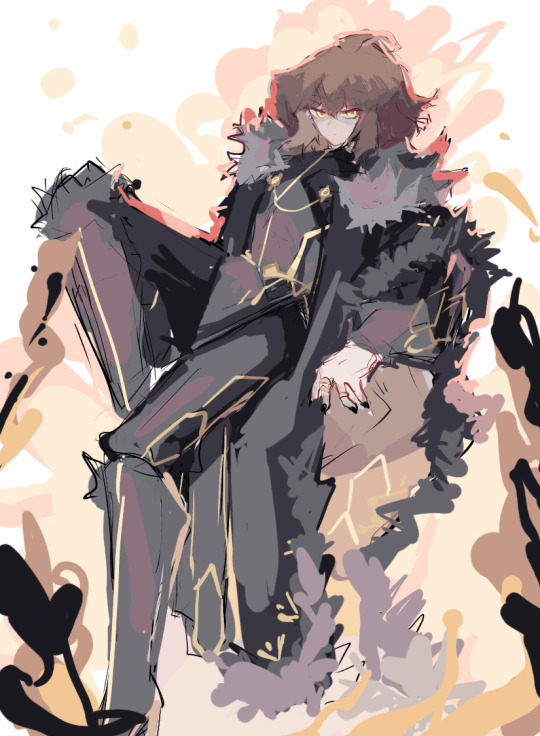
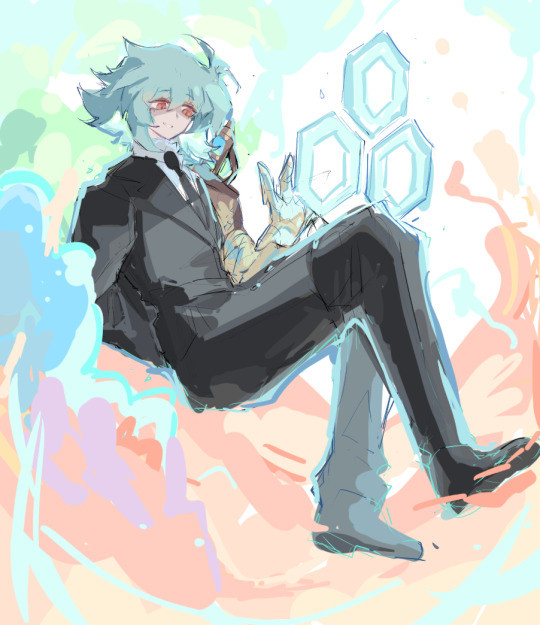
Spiritshipping fans anyone
#spiritshipping#yugioh#judai yuki#yuki judai#johan andersen#yugioh gx#projmoon#project moon#supreme king judai#haou#haou judai
215 notes
·
View notes
Note
Andddd here's Jesse
God bless duel links 2/2






I love duel links for this. You can see the shock and hurt in Jesse’s eyes in the first shot. As he realizes who is in front of him.
This also just reaffirms why Jesse is so important for Jaden.
He immediately call him out. Therefore is no beating around the bush. You are Jaden. There is no denial. Jaden needs him. He will be what Jaden needs
He calls out to him and tries to call him back like he did in the Viper duel. You’re not alone. We’re here with you. I’m here with you.
But Jaden’s to far gone to hear him.
(Do you think tear down the line Jaden will wake up in a cold sweat remembering this moment, where the love of his life called out to him to try and help him and he just straight up called Jesse a weakling to his face. Do you think he dies of cringe? Meanwhile Jesse is laying asleep next to him none the wiser and just having the best sleep)
#yugioh gx#jaden yuki#judai yuki#jesse anderson#johan andersen#spiritshipping#supreme king jaden#supreme king judai
39 notes
·
View notes
Text
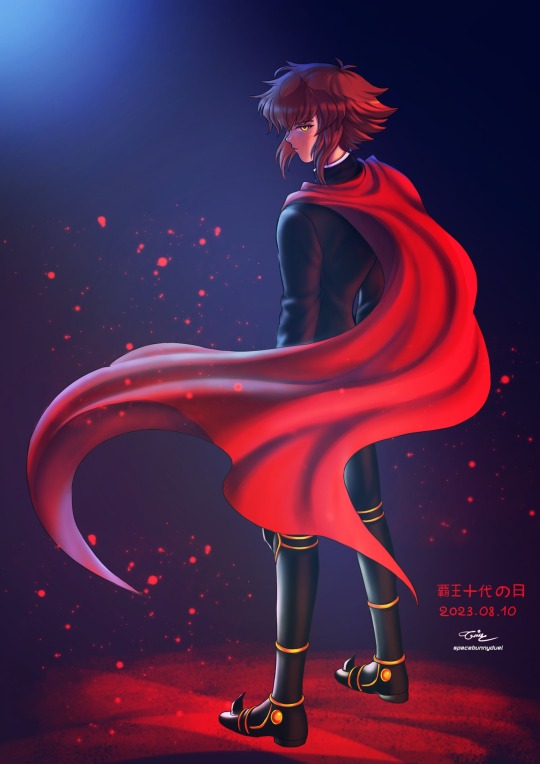
#spacebun’s art#yugioh gx#supreme king#yuki judai#yugioh#ygo#supreme king judai#supreme king jaden#jaden yuki#Haou#Haou’s Day
326 notes
·
View notes
Text

before the goods photoshoot
51 notes
·
View notes
Text

Supreme king jaden.. I think about you a lot
#Something something being consumed by your past self and having to deal with their guilt along with your own...#Hmmm#supreme king jaden#supreme king judai#jaden yuki#yuki judai#judai yuki#yugioh#yugioh gx#Yu-gi-oh#Yu gi oh#Ygo#Ygo gx#Tw blood#Ygogx
26 notes
·
View notes
Text

zoinks.
#judai yuki#jaden yuki#johan anderson#jesse anderson#ygo#ygo gx#yugioh#yugioh gx#spiritshipping#haou judai#supreme king judai#supreme king jaden#supreme king#shitpost
41 notes
·
View notes
Text

#yugioh#yugioh gx#supreme king jaden#supreme king judai#alexis rhodes#asuka tenjoin#tyranno hassleberry#tyranno kenzan#chazz princeton#jun manjoume#yuki judai#jaden yuki
58 notes
·
View notes
Text
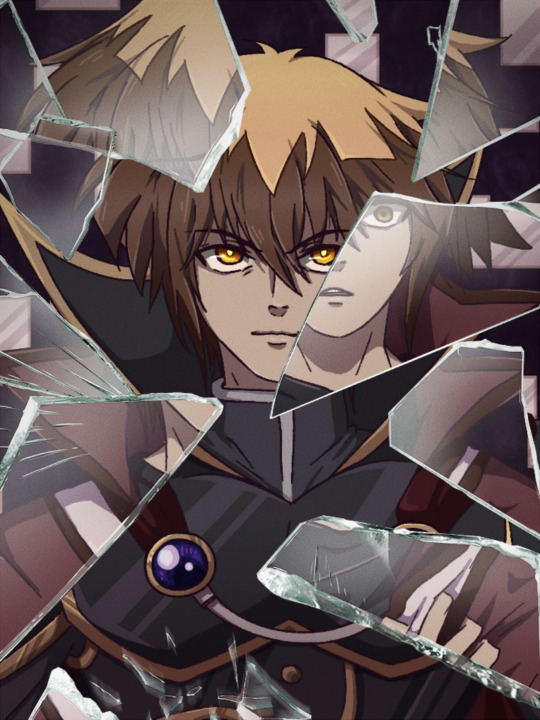
Yu-Gi-Oh! GX AMV - Supreme King Jaden What I've Done has been added to queue 👑
#yugioh gx#ygo gx#judai yuki#jaden yuki#yugioh#ygo#haou#supreme king judai#the supreme king#admin: slifer slacker#art
955 notes
·
View notes
Text
Hello Spiritshipping community! (๑ᴖ◡ᴖ๑)♪
Today there’s an exciting news for everyone! 📢 We’re going to have this new little celebration event dedicated to our beloved ship!!! ↓ ↓ ↓
✨🌈 Johan x Judai Week 2024 🌈✨

. ݁₊ ⊹ . ݁ ⟡ ݁ . ⊹ ₊ ݁.⟡. ݁₊ ⊹ . ݁
Spiritshipping featured two passionate duelists Johan Andersen and Yuki Judai (aka Jesse Anderson and Jaden Yuki), the wholesome cute couple that has been well-loved by its fans for almost 2 decades and still keep going. 💖 On the occasion of the Yugioh! GX’s 20th anniversary, it’s a perfect time for us Spiritshippers from all over the world to unite again celebrating in the first JohanxJudai Week this year! 🎉
⭐️ How to participate!
🗓 Date: April 10th - April 16th, 2024. Each day will have a theme, you can also submit work out of order, or only work for the themes you want. Late submissions are always accepted! There is no deadline.
✍️ What you can submit: fanarts, sketches, doodles, comics, fanfics, drabbles, photos, crafts, cosplays etc. On Twitter/Tumblr or both. It’s doesn’t matter the medium or size in which you show your submission! Everything is WELCOME as long as it mainly features the couple of Spiritshipping JohanxJudai/JessexJaden. 💎🍤
🏷 Important! Beside the tags #Spiritshipping, please make sure to also add these following tags:
On Tumblr: (with space)
#Johan x Judai Week 2024
#Spiritshipping Week 2024
On Twitter X/Twitter: (no space)
#JohanxJudaiWeek2024
#SpiritshippingWeek2024
#ヨハ十週間2024
💎 Other varieties of Spiritshipping like #Darkspiritshipping (Dark Johan x Judai/Supreme King) and #Infiniteshipping (Crystal Keeper/Crystal Master x Judai/(past life) Supreme King) are also WELCOME! ✨ You can add the extra ship tags instead.
👉 If you’re participating doing fanfics for this event, please share the link for your work and also add it to our AO3 collection.
👉 Please feel free to participate without asking us for permission! 🤗 Just remember to post your submissions using the proper #tags listed above.
👉 If you have any questions, you can contact us over our Tumblr, Twitter, send ask or DMs, or write us email 📮[email protected]
🌷 We hope this event will give everyone a good chance to have fun together creating and expressing love to our favorite ship and even make more new friends! (((*°▽°*)八(* ´ ω `*)))
Follow us on Tumblr and Twitter for more updates and future events. ❤️
The countdown will begin at the start of April 2024! Time for preparation!
See everyone soon! (˵ •̀ ᴗ - ˵) ✧
Update: We just started a Discord server! If anyone interested, please send us message to receive an invite link! ✨
#Johan x Judai Week 2024#Spiritshipping week 2024#spiritshipping#darkspiritshipping#infiniteshipping#johan andersen#yuki judai#jesse anderson#jaden yuki#yugioh#yugioh gx#supreme king#johan x judai#johan x judai week#haou#haou judai#supreme king judai#supreme king jaden#johanxjudaiweek2024#spiritshippingweek2024
38 notes
·
View notes
Text
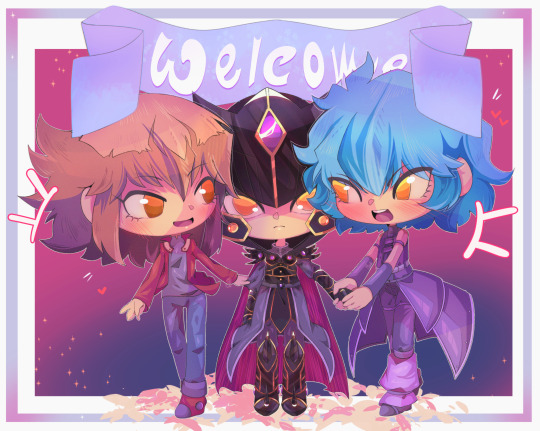
collab with @bassomega with our favourite little guys ♡
#madicham#artists on tumblr#artists on twitter#yugioh gx#haou#supreme king judai#yubel#johan#hell johan#jaden yuki#judai yuki#jesse anderson#yugioh fanart#just in time for my birf#thamk you sly iluuu
42 notes
·
View notes